Introduction
Tremor is a rhythmic movement of a body part which is involuntary (out of our control). It looks like trembling or shaking movement of hands and / or feet.
What are the causes of tremor?
Parkinson's Disease (PD)
PD is a neurological disorder that usually affects the elderly people (more than 65 years old). However, it may occasionally occur in young people (20-40 years old). The tremor of PD is usually present when the hands and / or feet are rested. Some patients have jaw tremor. Other symptoms of PD are stiffness of muscles and slowness of movement.
PD should be diagnosed because the treatment of PD is one of the most successful in the history of medicine – patients generally respond well to medications and brain surgery.
Without treatment, PD significantly affects the quality of life of patients.
Essential Tremor (ET)
ET is a neurological disorder which usually affects young and middle-aged people. ET causes tremor of hands when the arms are outstretched or while holding spoon / writing. ET is sometimes inherited. Generally, ET is not a disabling illness and does not require specific treatment. However, a small percentage of patients with ET has severe tremor which can significantly affect the quality of life of patients and require treatment.
Thyroid Disorders
Raised level of thyroid hormone can cause hand tremor. As such, blood level of thyroid hormone should be tested in patients who have tremor. The treatment of thyroid disorder results in significant reduction in tremor.
Emotional Disorders
Hand tremor can be a feature of emotional disorders such as Anxiety disorder and Depression, often accompanied by other symptoms such as numbness, palpitation, dizziness and difficulty in breathing.
When should a patient with tremor consult the Neurologist?
All patients with tremor are advised to consult the Neurologist, especially when the tremor has:
- become more and more severe
- is associated with slowness of movement
- is associated with emotional distress
- significantly affected the quality of life, daily activities or work performance
What will the Neurologist do for patients with tremor?
The Neurologist will perform physical examination, blood tests (especially thyroid hormone level) and MRI brain scan. When necessary, the Neurologist will refer the patients to the Psychiatrist.
** Image by freepik

